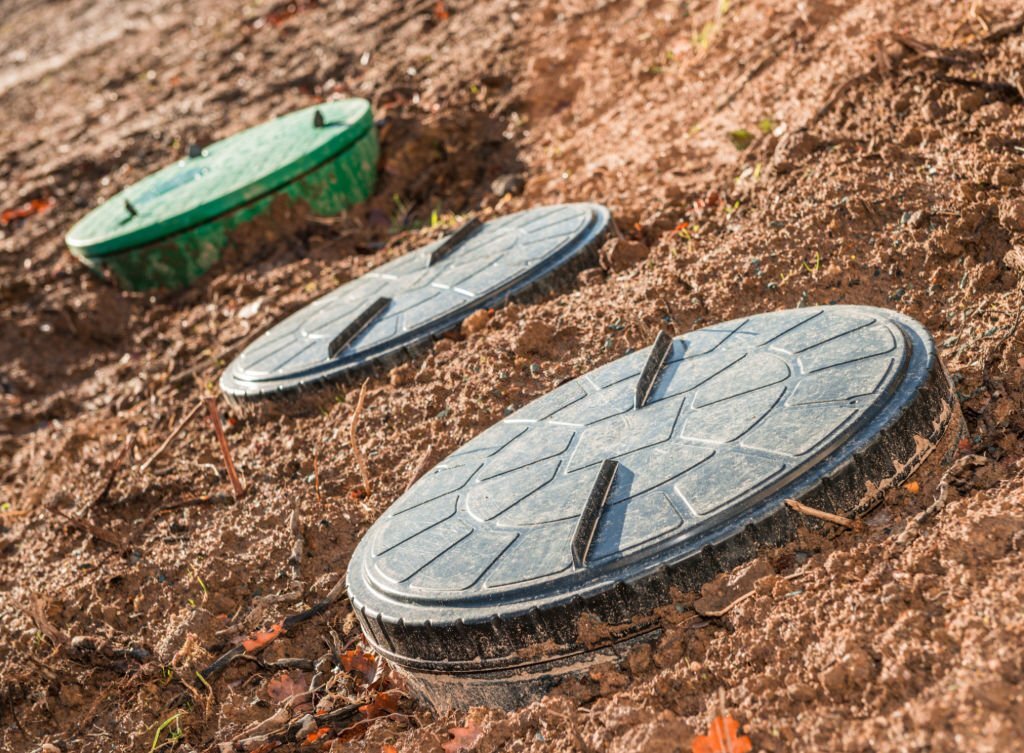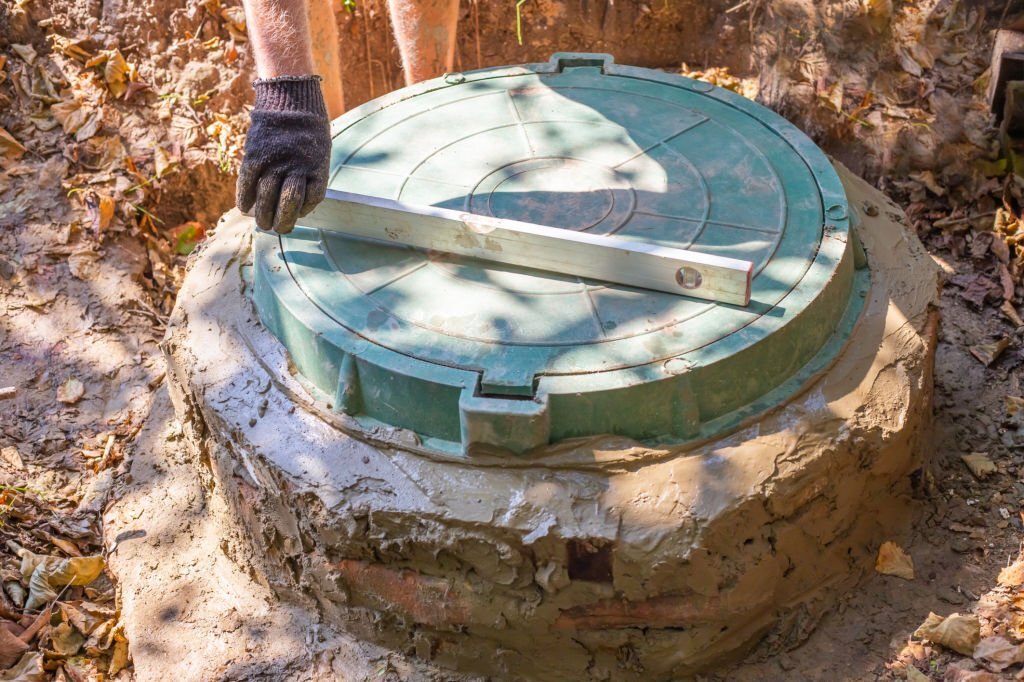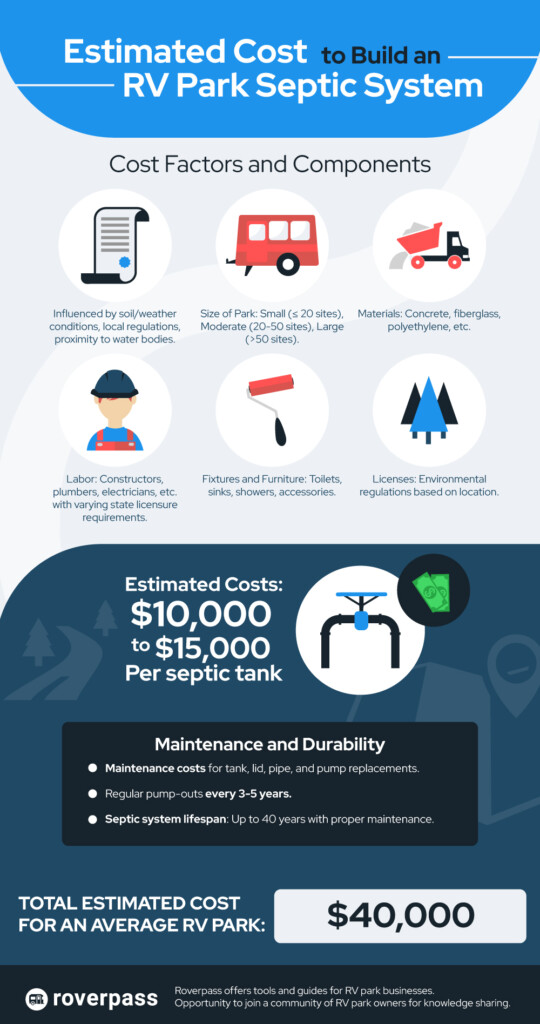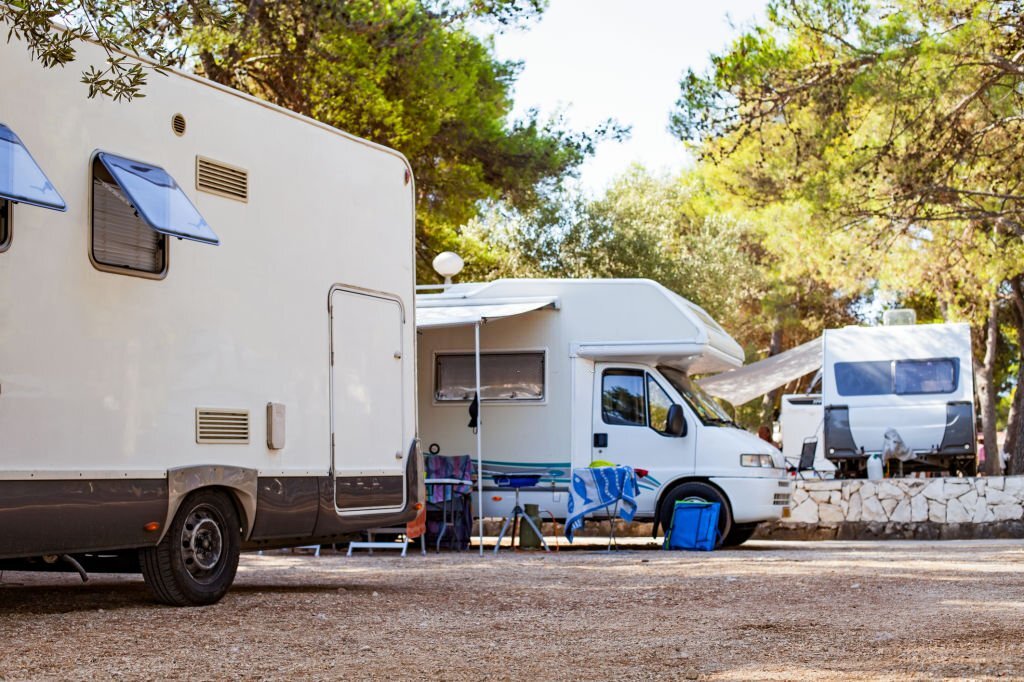
What is the Estimated Cost to Build an RV Park Septic System?
Building a wastewater management system is one of the first things to consider when you start planning your RV park business. Though there are different types of wastewater solutions, septic systems are widely used by RV parks due to their healthiness, efficiency, durability, and environmental friendliness.
The process of building your RV park’s septic system will involve buying materials, hiring employees, choosing fixtures, acquiring licenses, and more.
In this article, we will provide you with an overview of everything you need to build a septic system at your RV park. This should allow you to estimate as accurately as possible the costs you will be facing and plan ahead more efficiently.
How Septic Systems Work

A septic system is basically an underground wastewater treatment structure. Though there are different types of septic systems, most RV parks use traditional systems that typically consist of plumbing, a septic tank, and a drain field or soil absorption field.
To provide effective treatment to wastewater produced in bathrooms, kitchen drains, and laundry, septic systems combine natural and technical processes.
The septic tank is a water-tight container buried in the ground that is usually made of concrete, fiberglass, or polyethylene. There, organic matter is digested and floatable matter and solids are separated from the wastewater.
The liquid wastewater then exits the tank into the drain field, which consists of a series of perforated pipes buried in a leach field or chamber. Once there, the liquid is slowly released until it finally reaches the soil.
Breaking Down the Costs of Building an RV Park Septic System
Though the final cost of building an RV park septic system can vary widely depending on a number of factors, we will try to provide an estimated cost based on its different components.
A wide range of highly variable aspects such as soil and weather conditions, proximity to water bodies, local regulations, and others will influence the final cost of the RV park septic system. Below, we will take a look at those components of the cost that are common to the process of building a septic system at any RV park:
1. Size
To ensure the septic system of your park as a whole functions appropriately, you will need a different number of septic tanks depending on the size of the park and the quantity of campsites.
We will divide RV park sizes into three basic categories:
- Small (20 sites or less): requires a minimum of two septic tanks
- Moderate (20 to 50 sites): requires a minimum of 4 septic tanks
- Large (+50 sites): requires 6 or more septic tanks
2. Materials
Of course, the price of construction materials varies widely based on quality and quantity. Be that as it may, take into account that they will represent a significant part of your budget. Materials used to build a septic system may include fiberglass, lumber, cement, plastic, poly, cement paste, and concrete blocks, among others.
3. Labor
The labor force involved in building a septic system includes professionals from a few different areas. In addition to hiring a constructor, you may need to employ plumbers, electricians, and other professionals. Keep in mind that most states require septic tank installers to be licensed or certified. Requirements can vary significantly from one state to another.
4. Fixtures and Furniture
Though septic systems are basic amenities, RV parks must seize every opportunity to stand out in an increasingly competitive market. So as you build your own septic system, you should also consider how you can make your guests’ experience more comfortable and rewarding.
Toilets, sinks, and showers, as well as other furniture items such as paper holders, towel racks, or soap dispensers will also have an impact on the way your campground is valued and perceived by your guests.
Again, prices of all these fixtures and pieces of furniture may differ widely depending on their quality.
5. Licenses
Depending on where your RV park is located, you may need to acquire different licenses before you start building. Some sites may have strict environmental regulations due to their proximity to water bodies, in which case the additional testing and permits may elevate the cost of your septic system.
Keep in mind maintenance costs
Though not part of building the septic system per se, maintenance costs should be taken into account.
With proper maintenance, the lifespan of a septic system can be maximized, even though individual parts do suffer deterioration. Over time, you may need to replace tanks, lids, pipes, and pumps. Also, you will have to schedule septic tank pump-outs every three to five years to keep your system clean.
Want to Grow Your Campground Business?
Book a FREE, personalized demo to learn about how RoverPass will save you time and help you earn more revenue
Estimated Costs for RV Park Septic Systems

In general, considering drain fields, tanks, piping, fixtures, and labor, you should expect to pay between $10,000 and $15,000 per septic tank. This means that all in all, the cost of building an average RV park septic system in the United States can be estimated at around $40,000.
We have tried to break down the costs of building an RV park septic system as extensively as possible. Still, keep in mind that the purpose of these numbers is to give you a general idea of the costs you will encounter. As we said above, the final cost of your septic system may be very different depending on plenty of factors.
You can check out this Beginner’s Guide to Running a Profitable RV Park Business if you want to learn more about all the costs you will need to consider when planning for the building of your RV park.
Why Building a Septic System for Your RV Park

Now that we have broken down the cost of building a septic system for an RV park, we would like to conclude by exploring the differences between septic systems and other wastewater management solutions.
One question that usually arises is what is the difference between septic systems and sewage systems. Basically, septic treats wastewater on site, using the method detailed above. Sewer, on the other hand, directs wastewater to a centralized treatment plant operated by local authorities.
Most RV park owners choose septic systems over other alternatives, but why? Let’s take a look at what makes a septic system stand out as compared to other solutions.
It’s better for the environment
When properly maintained, septic systems are far better for the environment than other wastewater management systems. According to a report by the EPA, environmental benefits include helping remove pollution from surface water, recharging groundwater, and replenishing aquifers.
It’s better for public health
Septic systems reduce the threat of leaks. This way, the risk of disease transmission and human exposure to pathogens is significantly limited.
It reduces monthly costs
Given that you don’t need to be connected to the local sewer network, septic systems help you reduce the use of energy and avoid monthly sewage or water bills.
It’s durable (if properly maintained)
If maintenance actions are performed periodically, the lifespan of a septic tank can be up to forty years, making it a really durable investment.
Now that you have gained a clearer picture of what are the costs involved in building an RV park septic system, you can begin to plan ahead for the construction of this essential amenity for any RV park business willing to start accommodating RVers.
Roverpass is devoted to providing RV park businesses with top-tier tools, enhancing their opportunities to flourish in a fiercely competitive market. Our focus is on making your RV park not only a memorable destination for guests but also a profitable venture for owners. Continue exploring our blog for more Tips & Guides tailored to your needs. If you’re eager to connect with industry peers and stay ahead with innovative strategies, join our Facebook group today – a community where thriving RV park owners gather to share knowledge and success.